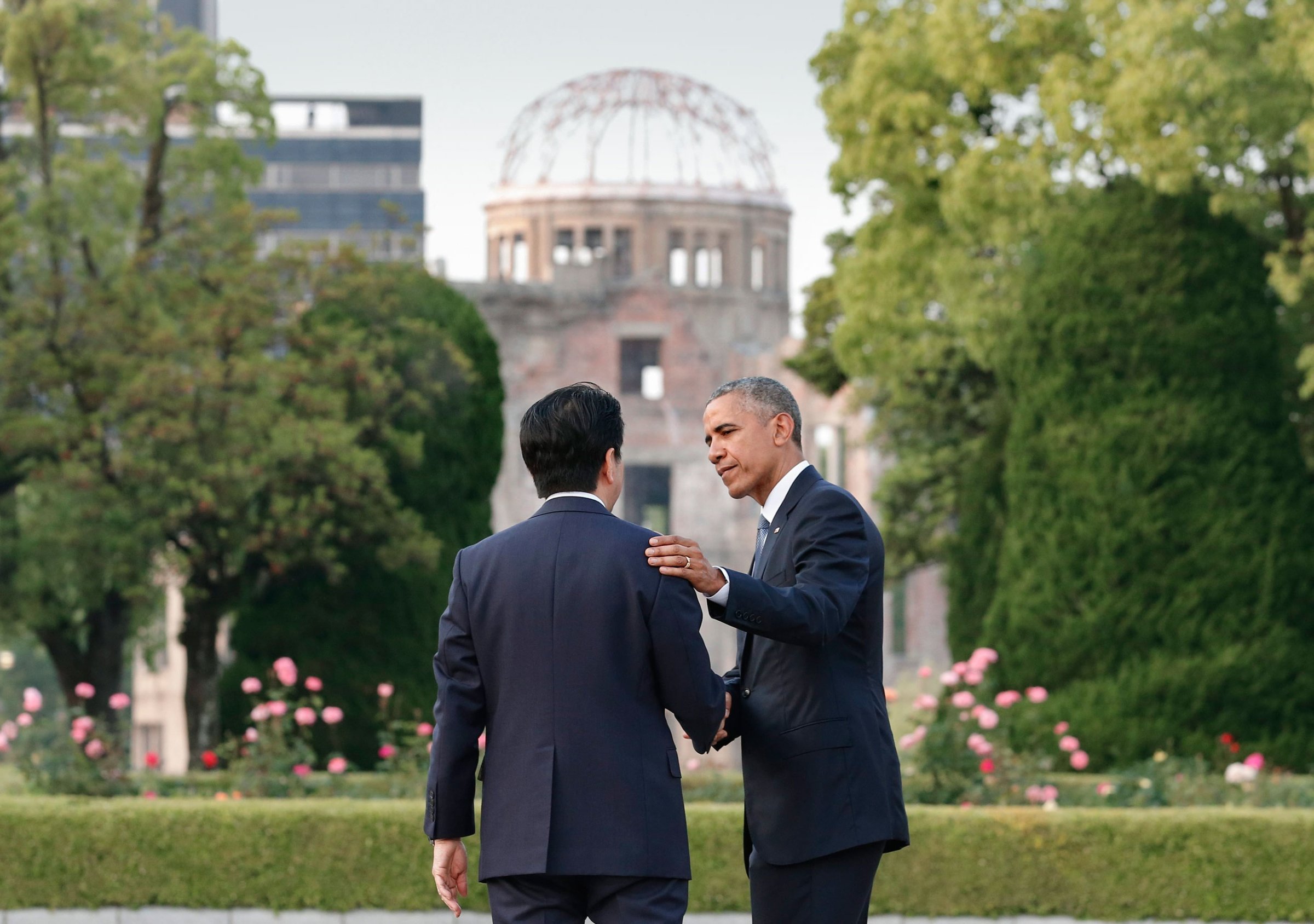
My grandfather was a kamikaze—a successful one. My Japanese mother never met her father so it was hard for her to miss him. Instead, some of her earliest memories were of American GIs handing out candy during the U.S. occupation of Japan after World War II.
My mother would go on to marry an American, one who served in World War II on the Allied side. My father had been a U.S. Marine correspondent who covered some of the fiercest battles of the Pacific. In the American Deep South where my father grew up, my mother, more than a generation younger than he, was referred to as the “Jap wife.” (She responded, cheerily, that she was now related to “barbarians.”) In rural Japan, one of my mother’s relatives, a priest in the native Shinto faith, refused to bless my parents’ union.
As U.S. President Barack Obama made his historic visit May 27 to Hiroshima—a city that denotes both ferocious war and enduring peace—I think of how quickly mistrust on both sides of the Pacific has dissipated. Wartime enemies are now not only friends but allies. Also, the yellow peril has migrated. Japan’s spectacular economic rise was followed by a postbubble humbling. Today, the role of America’s Asian adversary is filled by China, which has replaced Japan as the world’s second largest economy.
Obama’s pilgrimage to Hiroshima, ground zero of atomic annihilation, was meant to celebrate a peace that has lasted for seven decades. By laying a wreath at a cenotaph for the 140,000 victims of a bomb codenamed Little Boy, he also honored the more than 60 million people around the globe who were killed during World War II. During a speech at the Hiroshima Peace Memorial Park, Obama warned against assuming history turns in circles. “We’re not bound by our genetic code to repeat the mistakes of the past,” he said. “We can tell our children a different story.”
The victims of the war in the Pacific abounded far beyond two flattened Japanese cities. Americans of a certain age recall the horrors of Japanese POW camps, the death marches and the cruelty that too often is cast as inherent in the Orient. Asians who found little peace or prosperity in Japan’s own colonial enterprise, the Greater East Asia Co-Prosperity Sphere, remember sexual slavery and starvation.
In China, where I now live, Japanese atrocities are relived in textbooks. The horrors are real, but the ruling Chinese Communist Party has also found political expediency in highlighting foreign aggression and underplaying its own sins. Political campaigns—like the Great Leap Forward, which unleashed a great famine, and the Cultural Revolution—destroyed millions of Chinese lives. But atrocity has no mathematical equivalency: one Nanjing Massacre does not cancel out two atomic bombs on Hiroshima and Nagasaki. Both are awful. Both are parts of my heritage.
There is, in Japan, a cauterized attitude toward the war. The millions of Asians who suffered under the boot of the Japanese army wonder why Japanese apologies feel lacking—when they come at all. It was only when my mother attended graduate school in the U.S. that she learned the full extent of Japan’s wartime aggression. But the amnesia is directed inward too. Last year, my husband and I took our young sons to the Fire Museum in Tokyo because, like boys anywhere, they love fire stations. One of the exhibits referred to a time in the 1940s when firefighters were particularly busy; it did not specify who caused Tokyo to burn.
My Japanese grandmother lived through those firebombings, unleashed by U.S. planes. At least 100,000 Japanese were killed by the air raids, a fact few Americans know. My grandmother, a war widow, did not hold Americans—as a people—accountable for Tokyo, Hiroshima or Nagasaki. When I was a little girl, she would make me the Western dishes she had learned to cook before the war. I was her American grandchild, so I ate hotcakes, potato croquettes and pork cutlets. From the ruins of wartime loss and occupation, Japanese came to love jazz and jeans and mayonnaise.
Now that Japan’s hawkish Prime Minister Shinzo Abe is moving the country rightward, some outsiders wonder whether the nation’s lack of introspection could cause militarism to metastasize again. After all, Japan’s decades-long commitment to pacifism reflects both atomic victimhood and the humiliation of defeat. It does not, in the German way, speak to a national soul-searching about its wartime crimes.
Yet I do not worry that young Japanese will suddenly militarize en masse. I remember my grandmother’s description of what it was like to hear Emperor Hirohito’s message of surrender on the radio, the demi-divinity for whom her husband had sacrificed his life. It was, she said, such a high voice, such a human voice. We are all fallible but we move on.
More Must-Reads from TIME
- Cybersecurity Experts Are Sounding the Alarm on DOGE
- Meet the 2025 Women of the Year
- The Harsh Truth About Disability Inclusion
- Why Do More Young Adults Have Cancer?
- Colman Domingo Leads With Radical Love
- How to Get Better at Doing Things Alone
- Michelle Zauner Stares Down the Darkness
Contact us at letters@time.com